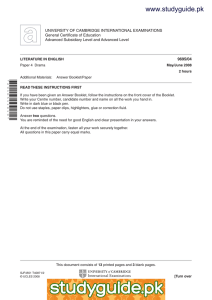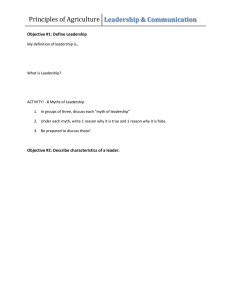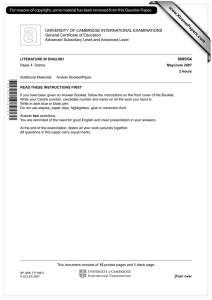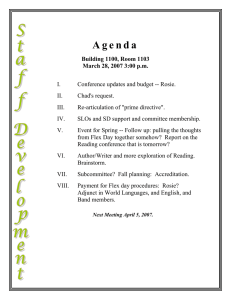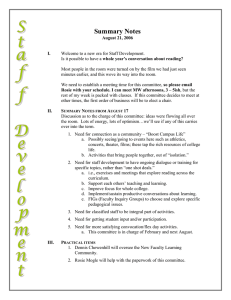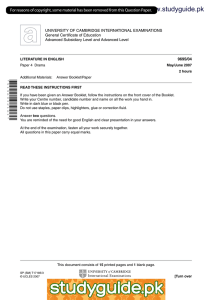www.XtremePapers.com
advertisement
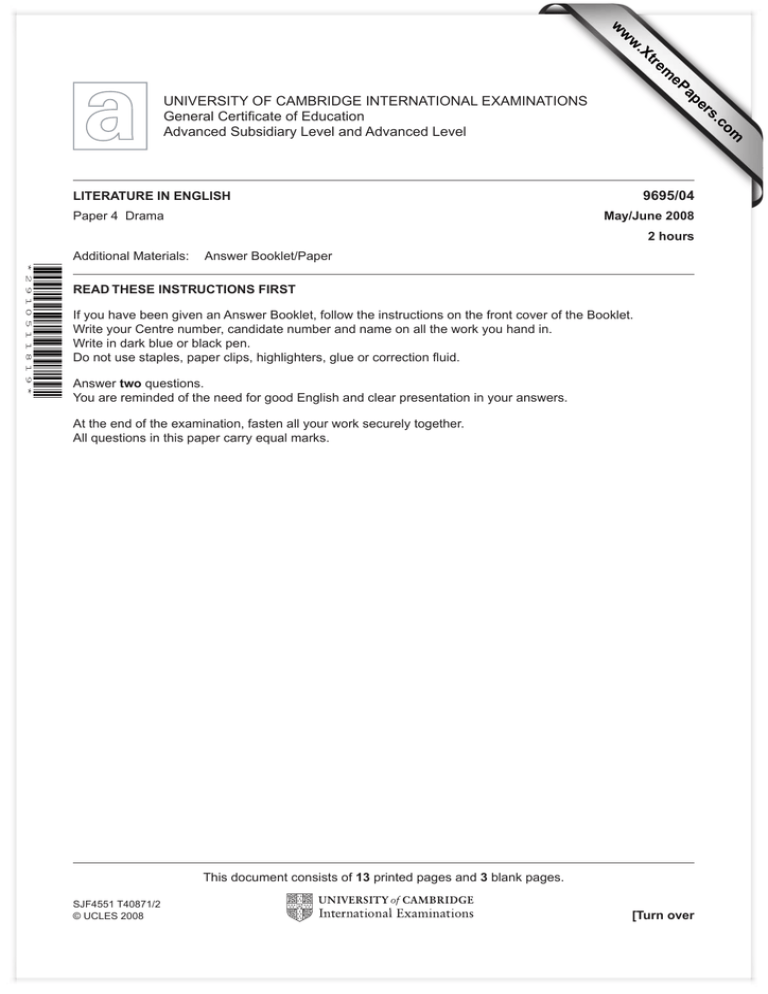
w w ap eP m e tr .X w om .c s er UNIVERSITY OF CAMBRIDGE INTERNATIONAL EXAMINATIONS General Certificate of Education Advanced Subsidiary Level and Advanced Level 9695/04 LITERATURE IN ENGLISH Paper 4 Drama May/June 2008 2 hours Additional Materials: Answer Booklet/Paper *2910511819* READ THESE INSTRUCTIONS FIRST If you have been given an Answer Booklet, follow the instructions on the front cover of the Booklet. Write your Centre number, candidate number and name on all the work you hand in. Write in dark blue or black pen. Do not use staples, paper clips, highlighters, glue or correction fluid. Answer two questions. You are reminded of the need for good English and clear presentation in your answers. At the end of the examination, fasten all your work securely together. All questions in this paper carry equal marks. This document consists of 13 printed pages and 3 blank pages. SJF4551 T40871/2 © UCLES 2008 [Turn over 2 ATHOL FUGARD: The Township Plays 1 Either (a) ‘That’s what I do, friends. Put down, in my way, on paper the dreams and hopes of my people.’ (Styles in Sizwe Bansi is Dead) How does Fugard present the hopes and dreams of his characters in these plays? Or (b) Comment closely on the dramatic action of the following scene from The Island and its significance for the play as a whole. Winston: When Polynices died in battle, all that remained was the empty husk of his body. He could neither harm nor help any man again. What lay on the battlefield waiting for Hodoshe to turn rotten, belonged to God. You are only a man, Creon. Even as there are laws made by men, so too there are others that come from God. He watches my soul for a transgression 5 even as your spies hide in the bush at night to see who is transgressing your laws. Guilty against God I will not be for any man on this earth. Even without your law, Creon, and the threat of death to whoever defied it, I know I must die. Because of your law and my defiance, that fate is now very near. So much the better. Your threat is nothing to me, Creon. 10 But if I had let my mother's son, a Son of the Land, lie there as food for the carrion fly, Hodoshe, my soul would never have known peace. Do you understand anything of what I am saying, Creon? John: Your words reveal only that obstinacy of spirit which has brought nothing but tragedy to your people. First you break the law. Now you insult the 15 State. Winston: Just because I ask you to remember that you are only a man? John: Winston: And to add insult to injury you gloat over your deeds! No, Antigone, you will not escape with impunity. Were you my own child, you would not escape full punishment. 20 Full punishment? Would you like to do more than just kill me? John: That is all I wish. Winston: Then let us not waste any time. Stop talking. I buried my brother. That is an honourable thing, Creon. All these people in your state would say so too, if fear of you and another law did not force them into silence. 25 John: You are wrong. None of my people think the way you do. Winston: Yes they do, but no one dares tell you so. You will not sleep peacefully, Creon. John: You add shamelessness to your crimes, Antigone. Winston: I do not feel any shame at having honoured my brother. John: Was he that died with him not also your brother? Winston: He was. John: And so you honour the one and insult the other. Winston: I shared my love, not my hate. John: Go then and share your love among the dead. I will have no rats’ law 35 here while yet I live. Winston: We are wasting time, Creon. Stop talking. Your words defeat your purpose. They are prolonging my life. John [again addressing the audience]: You have heard all the relevant facts. © UCLES 2008 9695/04/M/J/08 30 3 Needless now to call the state witnesses who would testify beyond 40 reasonable doubt that the accused is guilty. Nor, for that matter, is it in the best interests of the State to disclose their identity. There was a law. The law was broken. The law stipulated its penalty. My hands are tied. Take her from where she stands, straight to the Island! There wall her up in a cell for life, with enough food to acquit ourselves of the taint of her 45 blood. Winston [to the audience]: Brothers and Sisters of the Land! I go now on my last journey. I must leave the light of day forever, for the Island, strange and cold, to be lost between life and death. So, to my grave, my everlasting prison, condemned alive to solitary death. 50 [Tearing off his wig and confronting the audience as Winston, not Antigone.] Gods of our Fathers! My Land! My Home! Time waits no longer. I go now to my living death, because I honoured those things to which honour belongs. 55 [The two men take off their costumes and then strike their ‘set’. They then come together and, as in the beginning, their hands come together to suggest handcuffs, and their right and left legs to suggest ankle-chains. They start running … John mumbling a prayer, and Winston a rhythm for their three-legged run. 60 The siren wails. Fade to blackout.] Scene 4 © UCLES 2008 9695/04/M/J/08 [Turn over 4 WILLIAM SHAKESPEARE: Twelfth Night 2 Either (a) Discuss ways in which self-deception is significant in the play. Or (b) Comment closely on the following passage, looking carefully at how the Duke’s use of language establishes his character and sets up ideas about love that are developed later in the play. SCENE 1. The Duke’s palace. Enter ORSINO, Duke of Illyria, CURIO, and other Lords; Musicians attending. Duke: Curio: Duke: Curio: Duke: If music be the food of love, play on, Give me excess of it, that, surfeiting, The appetite may sicken and so die. That strain again! It had a dying fall; O, it came o’er my ear like the sweet sound That breathes upon a bank of violets, Stealing and giving odour! Enough, no more; ’Tis not so sweet now as it was before. O spirit of love, how quick and fresh art thou! That, notwithstanding thy capacity Receiveth as the sea, nought enters there, Of what validity and pitch soe’er, But falls into abatement and low price Even in a minute. So full of shapes is fancy, That it alone is high fantastical. Will you go hunt, my lord? What, Curio? The hart. Why, so I do, the noblest that I have. O, when mine eyes did see Olivia first, Methought she purg’d the air of pestilence! That instant was I turn’d into a hart, And my desires, like fell and cruel hounds, E’er since pursue me. 5 10 15 20 25 Enter VALENTINE How now! what news from her? Valentine: So please my lord, I might not be admitted, But from her handmaid do return this answer: The element itself, till seven years’ heat, Shall not behold her face at ample view; But like a cloistress she will veiled walk, And water once a day her chamber round With eye-offending brine; all this to season A brother’s dead love, which she would keep fresh And lasting in her sad remembrance. Duke: O, she that hath a heart of that fine frame To pay this debt of love but to a brother, How will she love when the rich golden shaft Hath kill’d the flock of all affections else That live in her; when liver, brain, and heart, These sovereign thrones, are all supplied and fill’d, Her sweet perfections, with one self king! © UCLES 2008 9695/04/M/J/08 30 35 40 45 5 Away before me to sweet beds of flow’rs: Love-thoughts lie rich when canopied with bow’rs. [Exeunt. Act 1, Scene 1 © UCLES 2008 9695/04/M/J/08 [Turn over 6 WILLIAM SHAKESPEARE: Julius Caesar 3 Either (a) ‘Antony’s strengths are Brutus’s weaknesses, which is why he is the ultimate winner in the struggle for power.’ Compare and contrast Shakespeare’s presentation of Antony and Brutus in the light of this statement. Or (b) With close attention to the language and action of this passage, discuss Shakespeare’s presentation of Brutus and his state of mind on the night before Philippi. Brutus: Lucius: Brutus: Lucius: Varro: Brutus: Varro: Brutus: Lucius: Brutus: Lucius: Brutus: Lucius: Brutus: Lucius: Brutus: © UCLES 2008 Re-enter LUCIUS with the gown. Give me the gown. Where is thy instrument? Here in the tent. What, thou speak’st drowsily? Poor knave, I blame thee not; thou art o’erwatch’d. Call Claudius and some other of my men; I’ll have them sleep on cushions in my tent. Varro and Claudius! Enter VARRO and CLAUDIUS. Calls my lord? I pray you, sirs, lie in my tent and sleep; It may be I shall raise you by and by On business to my brother Cassius. So please you we will stand and watch your pleasure. I will not have it so. Lie down, good sirs; It may be I shall otherwise bethink me. Look, Lucius, here’s the book I sought for so; I put it in the pocket of my gown. [VARRO and CLAUDIUS lie down. I was sure your lordship did not give it me. Bear with me, good boy, I am much forgetful. Canst thou hold up thy heavy eyes awhile, And touch thy instrument a strain or two? Ay, my lord, an’t please you. It does, my boy. I trouble thee too much, but thou art willing. It is my duty, sir. I should not urge thy duty past thy might; I know young bloods look for a time of rest. I have slept, my lord, already. It was well done; and thou shalt sleep again; I will not hold thee long. If I do live, I will be good to thee. [Music and a song. LUCIUS falls asleep. This is a sleepy tune. O murd’rous slumber! Layest thou thy leaden mace upon my boy, That plays thee music? Gentle knave, good night. I will not do thee so much wrong to wake thee. If thou dost nod, thou break’st thy instrument; I’ll take it from thee; and, good boy, good night. Let me see, let me see; is not the leaf turn’d down 9695/04/M/J/08 5 10 15 20 25 30 35 40 7 Where I left reading? Here it is, I think. [Sits down. Enter the Ghost of CAESAR. How ill this taper burns! Ha! who comes here? I think it is the weakness of mine eyes That shapes this monstrous apparition. It comes upon me. Art thou any thing? Art thou some god, some angel, or some devil, That mak’st my blood cold and my hair to stare? Speak to me what thou art. Ghost: Thy evil spirit, Brutus. Brutus: Why com’st thou? Ghost: To tell thee thou shalt see me at Philippi. Brutus: Well; then I shall see thee again? Ghost: Ay, at Philippi. Brutus: Why, I will see thee at Philippi, then. [Exit Ghost. Now I have taken heart thou vanishest. Ill spirit, I would hold more talk with thee. Boy! Lucius! Varro! Claudius! Sirs, awake! Claudius! Lucius: The strings, my lord, are false. Brutus: He thinks he still is at his instrument. Lucius, awake! Lucius: My lord! Brutus: Didst thou dream, Lucius, that thou so criedst out? Lucius: My lord, I do not know that I did cry. Brutus: Yes, that thou didst. Didst thou see any thing? Lucius: Nothing, my lord. Brutus: Sleep again, Lucius. Sirrah Claudius! [To VARRO] Fellow thou, awake! Varro: My lord? Claudius: My lord? Brutus: Why did you so cry out, sirs, in your sleep? Both: Did we, my lord? Brutus: Ay. Saw you any thing? Varro: No, my lord, I saw nothing. Claudius: Nor I, my lord. Brutus: Go and commend me to my brother Cassius; Bid him set on his pow’rs betimes before, And we will follow. Varro and Claudius: It shall be done, my lord. [Exeunt. 45 50 55 60 65 70 75 80 Act 4, Scene 3 © UCLES 2008 9695/04/M/J/08 [Turn over 8 CHARLOTTE KEATLEY: My Mother Said I Never Should 4 Either (a) ‘I feel that the structure tells the audience what a play means far more than the dialogue within the structure.’ What, in your view, does the structure of My Mother Said I Never Should contribute to its meaning? Or (b) How does Keatley develop the relationship between Doris and Rosie in the following extract? Doris: I’ll show you something. [Pulls the dustsheet off the piano from Act One.] Rosie [pause]: It’s the piano. Doris: Don’t you like it? Rosie: We’ve got a synth at school. Doris: I had a friend called Cynth. Rosie: What’s this? [Picks up a plate on top of the piano.] Doris: It’s a salver. Jack’s employees gave it him on his retirement. It’s only plate, of course. Rosie [sniffs]: The silver smells funny. I hate old things. Doris: You hate dead things, not old things, Rosie. [Pause.] So do I. [Pause.] I’m old. Rosie: Hold this. So you can see your face in it. [DORIS holds the plate.] Sit down on the piano stool. [DORIS does so.] Doris: What are you going to do? Rosie: Aha. Close your eyes. 5 10 15 ROSIE stands behind her and puts her hands on DORIS’s cheeks, gently pulling the skin back and taut. Rosie: Smooth the wrinkles away … Doris: Nice warm hands, Rosie. Rosie: Now open your eyes, Gran. Doris: Oh! [She studies her reflection.] Rosie: There, see. You’re not old really. Only on the surface. [A moment. Then ROSIE lets go.] My outside’s the same as my inside. That’s why when I talk Mum thinks I’m being rude. 25 20 Doris [gets up, puts the salver in the box ]: When you’re old … if you’re rude … they just think your mind is going. [Pause.] They never understand that it’s anger. [Pause.] Help me polish the piano. Rosie: Do I have to? Doris: There’s some dusters and polish in Margaret’s holdall. 30 Rosie [passes them. Reads tin]: ‘Bradley’s beeswax.’ With a picture of a bee. Here. Doris: That’s Jack’s firm, of course. [Tries, then.] Can you unscrew it? Rosie [does so]: What was your surname, Gran? Doris: Partington. Here, you take this cloth, and do the legs. ROSIE does. 35 They polish the piano during the following. © UCLES 2008 9695/04/M/J/08 9 Rosie: We’re doing a project about you at school. Doris: About me? Rosie: Yeah, you’re working class Lancashire, aren’t you? Doris: Do I look like it? Rosie: Yeah … [As if from school book.] ‘Oldham families were all cotton or paper. Despite the decline in the manufacturing industries, community spirit remained strong.’ 40 Doris [reminiscing]: You’d give a neighbour a bit of sugar, bit of soap, what they needed. When the King came, we scooped up the manure for the 45 tomatoes. Pride costs nothing. Rosie: That’s what they said on the documentary we saw at school. Doris: Did they now. You’ve missed a bit there, see. When Mother and I arrived in Jubilee Street, the landlady, a big woman, arms like beef, though she wore fancy hats, said ‘I didn’t know you had a babby’. ‘You 50 never asked’, said Mother. She did! And that was that. Rosie: You didn’t have a Dad? Doris: No. Rosie: Does Mum know? Doris: No. Rosie: Can it be our secret? 55 Act 2 © UCLES 2008 9695/04/M/J/08 [Turn over 10 ARTHUR MILLER: A View from the Bridge 5 Either (a) ‘Eddie, I never meant to do nothing bad to you.’ How does Miller present Catherine’s attitude towards Eddie during the course of the play? Or (b) Comment closely on the dialogue and action of the following passage, showing how Miller creates a dramatic climax here. Beatrice: Go ahead, Rodolpho. He’s a good boxer, he could teach you. Rodolpho [embarrassed]: Well, I don’t know how to – [He moves down to EDDIE.] Eddie: Just put your hands up. Like this, see? That’s right. That’s very good, keep your left up, because you lead with the left, see, like this. [He gently moves his left into RODOLPHO’s face.] See? Now what you gotta do is you gotta block me, so when I come in like that you – [RODOLPHO parries his left.] Hey, that’s very good! [RODOLPHO laughs.] All right, now come into me. Come on. 5 Rodolpho: I don’t want to hit you, Eddie. Eddie: Don’t pity me, come on. Throw it, I’ll show you how to block it. 10 [RODOLPHO jabs at him, laughing. The others join.] ’at’s it. Come on again. For the jaw right here. [RODOLPHO jabs with more assurance.] Very good! Beatrice [to MARCO]: He’s very good! [EDDIE crosses directly upstage of RODOLPHO.] Eddie: 15 Sure, he’s great! Come on, kid, put sump’m behind it, you can’t hurt me. [RODOLPHO, more seriously, jabs at EDDIE’s jaw and grazes it.] Attaboy. [CATHERINE comes from the kitchen, watches.] Now I’m gonna hit you, so block me, see? 20 Catherine [with beginning alarm]: What are they doin’? [They are lightly boxing now.] Beatrice [ – she senses only the comradeship in it now.]: He’s teachin’ him; he’s very good! Eddie: Sure, he’s terrific! Look at him go! [RODOLPHO lands a blow.] ’at’s it! 25 Now, watch out, here I come, Danish! [He feints with his left hand and lands with his right. It mildly staggers RODOLPHO. MARCO rises.] Catherine [rushing to RODOLPHO]: Eddie! Eddie: Why? I didn’t hurt him. Did I hurt you, kid? [He rubs the back of his 30 hand across his mouth.] Rodolpho: No, no, he didn’t hurt me. [To EDDIE with a certain gleam and a smile ] I was only surprised. Beatrice [pulling EDDIE down into the rocker]: That’s enough, Eddie; he did pretty good, though. Eddie: Yeah. [Rubbing his fists together ] He could be very good, Marco. I’ll 35 teach him again. [MARCO nods at him dubiously.] Rodolpho: © UCLES 2008 Dance, Catherine. Come. 9695/04/M/J/08 11 [He takes her hand; they go to phonograph and start it. It plays Paper Doll. 40 RODOLPHO takes her in his arms. They dance. EDDIE in thought sits in his chair, and MARCO takes a chair, places it in front of EDDIE, and looks down at it. BEATRICE and EDDIE watch him.] Marco: Can you lift this chair? Eddie: What do you mean? Marco: From here. [He gets on one knee with one hand behind his back, and grasps the bottom of one of the chair legs but does not raise it.] Eddie: Sure, why not? [He comes to the chair, kneels, grasps the leg, raises the chair one inch, but it leans over to the floor.] Gee, that’s hard, I never knew that. [He tries again, and again fails.] It’s on an angle, 50 that’s why, heh? Marco: Here. 45 [He kneels, grasps, and with strain slowly raises the chair higher and higher, getting to his feet now. RODOLPHO and CATHERINE have 55 stopped dancing as MARCO raises the chair over his head. MARCO is face to face with EDDIE, a strained tension gripping his eyes and jaw, his neck stiff, the chair raised like a weapon over EDDIE’s head – and he transforms what might appear like a glare of warning into a smile of triumph, and EDDIE’s grin vanishes as he 60 absorbs his look.] CURTAIN Act 1 © UCLES 2008 9695/04/M/J/08 [Turn over 12 OSCAR WILDE: The Importance of Being Earnest 6 Either (a) Oscar Wilde said of the play that it ‘has as its philosophy … that we should treat all the trivial things seriously, and the serious things in life with sincere and studied triviality.’ In what ways does Wilde bring his view to life in The Importance of Being Earnest ? Or (b) How does Wilde create and develop humour in the following extract? [Enter MERRIMAN, followed by the footman. He carries a salver, table cloth, and plate stand. CECILY is about to retort. The presence of the servants exercises a restraining influence, under which both girls chafe.] Merriman: Shall I lay tea here as usual, Miss? 5 Cecily [sternly, in a calm voice]: Yes, as usual. [MERRIMAN begins to clear table and lay cloth. A long pause. CECILY and GWENDOLEN glare at each other.] Gwendolen: Are there many interesting walks in the vicinity, Miss Cardew? Cecily: Oh! yes! a great many. From the top of one of the hills quite close one 10 can see five counties. Gwendolen: Five counties! I don’t think I should like that; I hate crowds. Cecily [sweetly ]: I suppose that is why you live in town? [GWENDOLEN bites her lip, and beats her foot nervously with her parasol.] Gwendolen [looking around]: Quite a well-kept garden this is, Miss Cardew. Cecily: 15 So glad you like it, Miss Fairfax. Gwendolen: I had no idea there were any flowers in the country. Cecily: Oh, flowers are as common here, Miss Fairfax, as people are in London. Gwendolen: Personally I cannot understand how anybody manages to exist in the 20 country, if anybody who is anybody does. The country always bores me to death. Cecily: Ah! This is what the newspapers call agricultural depression, is it not? I believe the aristocracy are suffering very much from it just at present. It is almost an epidemic amongst them, I have been told. May I offer 25 you some tea, Miss Fairfax? Gwendolen [with elaborate politeness ]: Thank you. [Aside.] Detestable girl! But I require tea! Cecily [sweetly]: Sugar? Gwendolen [superciliously]: No, thank you. Sugar is not fashionable any more. 30 [CECILY looks angrily at her, takes up the tongs and puts four lumps of sugar into the cup.] Cecily [severely]: Cake or bread and butter? Gwendolen [in a bored manner]: Bread and butter, please. Cake is rarely seen at the best houses nowadays. 35 Cecily [cuts a very large slice of cake and puts it on the tray]: Hand that to Miss Fairfax. [MERRIMAN does so, and goes out with footman. GWENDOLEN drinks the tea and makes a grimace. Puts down cup at once, reaches © UCLES 2008 9695/04/M/J/08 13 out her hand to the bread and butter, looks at it, and finds it is cake. 40 Rises in indignation.] Gwendolen: You have filled my tea with lumps of sugar, and though I asked most distinctly for bread and butter, you have given me cake. I am known for the gentleness of my disposition, and the extraordinary sweetness of my nature, but I warn you, Miss Cardew, you may go too far. 45 Cecily [rising]: To save my poor, innocent, trusting boy from the machinations of any other girl there are no lengths to which I would not go. Gwendolen: From the moment I saw you I distrusted you. I felt that you were false and deceitful. I am never deceived in such matters. My first impressions of people are invariably right. 50 Cecily: It seems to me, Miss Fairfax, that I am trespassing on your valuable time. No doubt you have many other calls of a similar character to make in the neighbourhood. Act 2 © UCLES 2008 9695/04/M/J/08 14 BLANK PAGE 9695/04/M/J/08 15 BLANK PAGE 9695/04/M/J/08 16 BLANK PAGE Copyright Acknowledgements: Question 1 Question 4 Question 5 Copyright © 1993 Athol Fugard. Reprinted by permission of William Morris Agency, LLC on behalf of the Author. © Charlotte Keatley; My Mother Said I Never Should; Methuen Drama; 2003. Reprinted by permission of International Creative Management, Inc. Copyright © Arthur Miller. Permission to reproduce items where third-party owned material protected by copyright is included has been sought and cleared where possible. Every reasonable effort has been made by the publisher (UCLES) to trace copyright holders, but if any items requiring clearance have unwittingly been included, the publisher will be pleased to make amends at the earliest possible opportunity. University of Cambridge International Examinations is part of the Cambridge Assessment Group. Cambridge Assessment is the brand name of University of Cambridge Local Examinations Syndicate (UCLES), which is itself a department of the University of Cambridge. 9695/04/M/J/08
